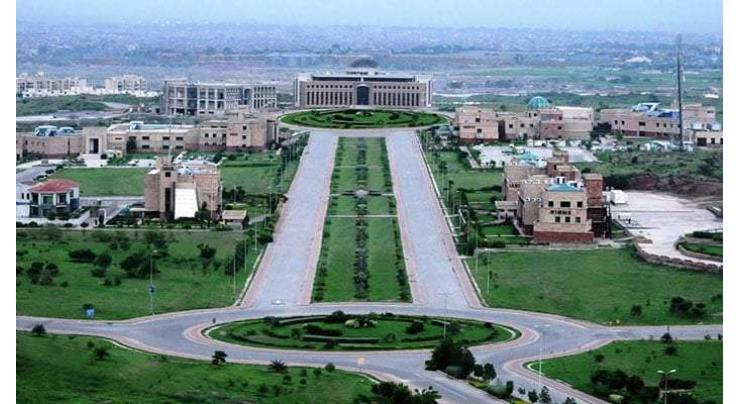
NUST Observes World Population Day With Focus On Youth Empowerment And Family Wellbeing
Muhammad Irfan Published August 07, 2025 | 10:52 PM

The Centre of Excellence on Population and Wellbeing Studies (CePwS) at the School of Social Sciences and Humanities (S3H), NUST, in collaboration with the United Nations Population Fund (UNFPA), commemorated World Population Day 2025 with a thought-provoking panel discussion and an essay-writing competition
ISLAMABAD, (UrduPoint / Pakistan Point News - 7th Aug, 2025) The Centre of Excellence on Population and Wellbeing Studies (CePwS) at the School of Social Sciences and Humanities (S3H), NUST, in collaboration with the United Nations Population Fund (UNFPA), commemorated World Population Day 2025 with a thought-provoking panel discussion and an essay-writing competition.
The event was centered on this year’s theme: “Empowering young people to create the families they want in a fair and hopeful world.”
Held at the CIPS Boardroom, Jinnah Auditorium, NUST, the event brought together a diverse group of experts from academia, government institutions, NGOs, INGOs, and universities including representatives from UNFPA, Population Council Pakistan, NIPS, AWF, SDPI, and others.
The keynote speakers included Ms. Latika Maskey Pradhan, Deputy Country Representative of UNFPA, who addressed Pakistan’s ongoing challenges in population management, the prevalence of child marriage, and the importance of women empowerment through effective policy interventions. Ms. Maria Qadri, Director Marcoms NUST, emphasized the significance of empowering youth to make informed family choices.
Dr. Daud Munir reflected on the critical role of governance, policy, and legislation in shaping family planning strategies, while Dr. Zafar Mahmood underscored the potential of Pakistan’s youth in transforming the country’s socio-economic and political landscape. Dr. Faisal Abbas, Director CePwS, highlighted the family as the cornerstone of society, influencing cultural and moral values.
The panel discussed structural barriers—such as harmful gender norms and lack of youth-centered support systems—that limit young people’s ability to make empowered life decisions.
Speakers urged the need to shift the narrative around reproductive health and family planning from being a "women-only" issue to a shared responsibility, advocating for the increased involvement of men—particularly fathers—as nurturing and emotionally present caregivers.
The event concluded with an essay competition and souvenir distribution ceremony, engaging students and youth advocates in dialogue around inclusive family planning and a hopeful, equitable future for all.
Recent Stories

NEPRA gives relief of Rs. 1.881 per unit

NAB auctions Bahria Town properties to recover defaulted plea bargain dues

Global food crisis deepens with over 2.3 bln facing insecurity, 203 mln undernou ..

Poetry gathering at Govt College Miranshah held in connection of I.D celebration ..

UAE carries out 65th airdrop of aid under 'Birds of Goodness' operation, deliver ..

ASEAN Committee holds third meeting in Abu Dhabi

Federal Government Employees Housing Authority (FGEHA) holds preliminary consult ..

NUST observes World Population Day with focus on youth empowerment and family we ..

50th Int'l Seerat-un-Nabi Conference to be held with renewed zeal in Rabi-ul-Aww ..

UAE, Russian Presidents discuss bilateral strategic partnership in Moscow

Sindh Cabinet approves reforms in Vehicle Registration, MDCAT oversight, heritag ..

Pakistan's total liquid foreign reserves $19.50 billion
More Stories From Pakistan
-

NEPRA gives relief of Rs. 1.881 per unit
4 minutes ago -

NAB auctions Bahria Town properties to recover defaulted plea bargain dues
41 minutes ago -
KP PA adopts resolution to change name of South Waziristan
1 hour ago -
Jashn-e-Azadi, Ma'rka-e-Haq celebrations continue in Karachi
1 hour ago -
Irrigation Secy for monitoring rivers, drains
1 hour ago -
Experts urge tech-driven healthcare reforms in Pakistan imperative
1 hour ago
-

Global food crisis deepens with over 2.3 bln facing insecurity, 203 mln undernourished in OIC states ..
43 minutes ago -
Senate Chairman attends Qul-Khawani of late Tanveer-ul-Hassan Gilani
1 hour ago -
CDA to use drones, Google Earth surveillance for anti-encroachment drive
1 hour ago -

Poetry gathering at Govt College Miranshah held in connection of I.D celebrations
43 minutes ago -
KP govt approves sanitation vehicles for all TMAs
43 minutes ago -
Chairman Senate honored with prestigious Paul Harris Fellow Award
1 hour ago



